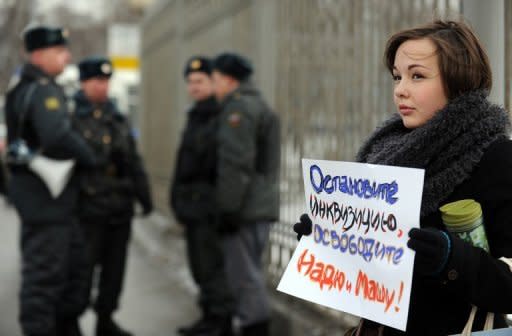Russia refuses to release anti-Putin punks
Russia on Wednesday refused to free from pre-trial detention two members of female opposition punk rock group Pussy Riot who face up to seven years in jail for performing in a church. A Moscow court rejected an appeal and ruled that Nadezhda Tolokonnikova and Maria Alekhina, must stay in detention until late April ahead of their trial for "hooliganism", even though they have small children. Outside the courtroom on Wednesday, police detained several demonstrators in scuffles as supporters of the women held single-person pickets, while an Russian Orthodox opponent sprinkled them with holy water. The radical all-female group has sung raucous anthems against Vladimir Putin's regime in public places including Red Square. Its members wear brightly coloured balaclavas to conceal their faces and use nicknames. On February 21, five members climbed onto the altar in Moscow's central Church of Christ the Saviour, often visited by Russia's rulers, and attempted to shout out a song they called a "Punk Prayer" before being seized by guards. The women all escaped, but police later charged two women with hooliganism in an organised group, a criminal charge rarely applied to opposition protests. They will remain in custody until April 24. "There is a political motive because politicians and religious believers have taken a stand against the February 21 performance. Important people. And it's likely the investigation has been biased," one of the women's lawyers, Mark Feigin, told AFP. He said the women were continuing a hunger strike they announced last week over their detention, although they had eaten a little after serious weight loss. The stunt has divided public opinion in Russia, where some 70 percent describe themselves as Orthodox Christian. Even Putin has weighed in on the debate, with his spokesman Dmitry Peskov telling TV Dozhd channel that the premier had a "negative" opinion of the group. In the Siberian city of Novosibirsk, supporters created posters showing the group's members as balaclava-wearing icons, protest artist Artyom Loskutov wrote on his blog. On Wednesday, pro-Kremlin youth group Nashi released a statement saying that Pussy Riot "exploited the religious feelings of fellow citizens to express their political position." Supporters outside the courtroom carried posters with slogans including "Free the women!" "I'm here because I'm against the hate that society is expressing against these women. I'm against those who are calling us to stone them," said Maria Sevastyanova. The case has caused huge controversy in Russia with the church saying their behaviour deeply offended believers. But other figures argued that even if the girls deserved to be punished in some way, their treatment has been too severe. "The vast majority of Orthodox believers unequivocally condemn these acts," Russian Orthodox Church spokesman Vsevolod Chaplin told AFP on Wednesday, however, while stressing that the church would not intervene in the case. "They should have thought about their children before," he added. But the head of the presidential council on human rights, Mikhail Fedotov, on Tuesday said however that the women's offence should be classed as non-criminal and punished with a maximum 15 days in police detention cells. Lyudmila Alexeyeva of the Moscow Helsinki Group on Tuesday was among those to sign an open letter calling for the women to be released without charge. The letter called for the women to be internationally recognised as "prisoners of conscience."



